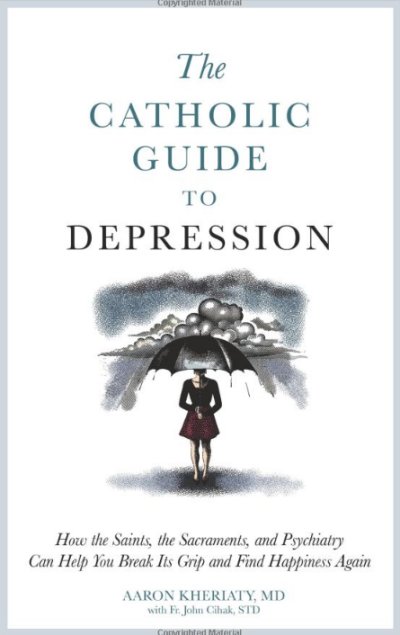Book Review
The Catholic Guide To Depression:
How the Saints, the
Sacraments, and Psychiatry can help you break its grip and find
happiness again
Aaron Kheriaty, MD
with Fr John Cihak, STD
Sophia
Institute Press
ISBN 978-1-933184-76-0
 This
superb book sets out to do exactly what it claims. Depression as
an illness is examined from both a psychiatric and spiritual
perspective. The various types of depression are examined as
well as their cause. It is noted that not all depression has a
spiritual cause and it is therefore important for spiritual
persons with depression to seek a medical remedy to this very
serious condition. Since depression is an illness, the ultimate
cause is the Fall of man. It can thus afflict people without it
being their fault. Although a spiritual person may suffer
depression, there is a wealth of research to show that religion
is in fact good for mental health.
This
superb book sets out to do exactly what it claims. Depression as
an illness is examined from both a psychiatric and spiritual
perspective. The various types of depression are examined as
well as their cause. It is noted that not all depression has a
spiritual cause and it is therefore important for spiritual
persons with depression to seek a medical remedy to this very
serious condition. Since depression is an illness, the ultimate
cause is the Fall of man. It can thus afflict people without it
being their fault. Although a spiritual person may suffer
depression, there is a wealth of research to show that religion
is in fact good for mental health.
The author reminds us that God cares about the depressed person. More than that, He suffers with us and for us on the Cross. The tragedy of suicide is examined. The author rightly states that suicide is objectively gravely sinful but there may be no subjective sin. Up to 95% of those who commit suicide have a mental disorder. A healthy religious belief protects one from suicide.
Depression needs to be distinguished from spiritual conditions such as sloth and the dark night of the soul. This latter is a wonderful gift given by God to purify the soul. Mother Teresa, for example, experienced the dark night of the soul for decades but she remained an incredibly joyful person. Depression and the dark night need to be treated in very different ways.
It is noted that there are changes in the brain chemistry when one is depressed. Anti-depressants are therefore a good option when prescribed appropriately. The way we think can also change our brain chemistry. Therefore cognitive therapy may also play a vital role in the management of depression. The author looks at the limitations of these therapies.
The vital need for a solid spiritual life is discussed in some detail. Not surprisingly, the final chapter is on Divine Filiation and the virtue of Hope.
This is a very well written book and it is recommended to those in health care, those who have depression and to the interested non-medical reader.
REVIEWED BY DR PRAVIN THEVATHASAN
